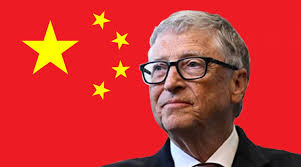
On Friday, Chinese President Xi Jinping spoke with Bill Gates about the worldwide expansion of artificial intelligence and expressed his support for American companies like Microsoft bringing their AI technology to China, according to two persons familiar with the conversation.
During their discussion in Beijing, Xi and Microsoft's expansion into China, according to one of the sources.
Gates, a co-founder of Microsoft, left the company's board in 2020 to devote more time to philanthropic endeavours pertaining to international health, education, and climate change.
In reports of the meeting released by Chinese state media or in a Friday article by Gates reflecting on his China trip, the remarks about AI made at the meeting between Xi and Gates were not made public.
The Bill & Melinda Gates Foundation pointed Reuters to the post when contacted for comment.
Microsoft and the Chinese government's information office, the State Council Information Office, did not immediately respond to demands for comment.
China is currently considering a new legislation on the technology as well as regulations for generative AI, according to Xi, who has previously stated that the government must grab possibilities to use AI to spur economic development while also warning about its perils.
His meeting with Gates takes place at a time when ties between the US and China are at an all-time low, with AI serving as a major flashpoint.
A number of export regulations have been implemented by the U.S. to impede China's AI growth, while China has alarmed the international business world with a crackdown on consultants and a prohibition on some sales by American chipmaker Micron in China.
Microsoft supports OpenAI, whose chatbot ChatGPT sparked a global AI craze that has reached China last year.
Chinese authorities do not censor OpenAI or ChatGPT, although OpenAI does not allow users in some nations, including Hong Kong and mainland China, to sign up.
Microsoft has a sizable research facility in China and has been present there for more than 30 years. Although its search results on critical issues are filtered, its Bing portal is the only international search engine accessible from within China's so-called Great Firewall.
The American IT titan has encountered issues in China recently as the nation has strengthened its grip over the internet industry.
It discontinued LinkedIn China in 2021 and replaced it with a condensed version that mainly focused on jobs.
It stated that it will maintain a presence in China but would also shut down that app in May, citing tough competition and financial difficulties.
(Source:www.reuters.com)
During their discussion in Beijing, Xi and Microsoft's expansion into China, according to one of the sources.
Gates, a co-founder of Microsoft, left the company's board in 2020 to devote more time to philanthropic endeavours pertaining to international health, education, and climate change.
In reports of the meeting released by Chinese state media or in a Friday article by Gates reflecting on his China trip, the remarks about AI made at the meeting between Xi and Gates were not made public.
The Bill & Melinda Gates Foundation pointed Reuters to the post when contacted for comment.
Microsoft and the Chinese government's information office, the State Council Information Office, did not immediately respond to demands for comment.
China is currently considering a new legislation on the technology as well as regulations for generative AI, according to Xi, who has previously stated that the government must grab possibilities to use AI to spur economic development while also warning about its perils.
His meeting with Gates takes place at a time when ties between the US and China are at an all-time low, with AI serving as a major flashpoint.
A number of export regulations have been implemented by the U.S. to impede China's AI growth, while China has alarmed the international business world with a crackdown on consultants and a prohibition on some sales by American chipmaker Micron in China.
Microsoft supports OpenAI, whose chatbot ChatGPT sparked a global AI craze that has reached China last year.
Chinese authorities do not censor OpenAI or ChatGPT, although OpenAI does not allow users in some nations, including Hong Kong and mainland China, to sign up.
Microsoft has a sizable research facility in China and has been present there for more than 30 years. Although its search results on critical issues are filtered, its Bing portal is the only international search engine accessible from within China's so-called Great Firewall.
The American IT titan has encountered issues in China recently as the nation has strengthened its grip over the internet industry.
It discontinued LinkedIn China in 2021 and replaced it with a condensed version that mainly focused on jobs.
It stated that it will maintain a presence in China but would also shut down that app in May, citing tough competition and financial difficulties.
(Source:www.reuters.com)














